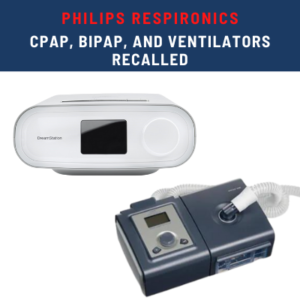FDA Recalls Philips Respironics CPAP, BiPAP, and Ventilators for Serious Health Risks
 The U.S. Food and Drug Administration (FDA) is alerting patients using Philips Respironics ventilators, BiPAP, and CPAP machines and their health care providers that Philips Respironics has recalled devices due to potential health risks.
The U.S. Food and Drug Administration (FDA) is alerting patients using Philips Respironics ventilators, BiPAP, and CPAP machines and their health care providers that Philips Respironics has recalled devices due to potential health risks.
Why Were Philips CPAP Machines Recalled
The polyester-based polyurethane (PE-PUR) sound abatement foam, which is used to reduce sound and vibration in these affected devices, may break down and potentially enter the device’s air pathway. When this occurs, black debris from the foam or certain chemicals released into the device’s air pathway may be inhaled or swallowed while using the device.
CPAP, BiPAP, and Ventilators Affected
|
Device Type |
Model Name and Number (All Serial Numbers) |
|
Continuous Ventilator, Minimum Ventilatory Support, Facility Use |
|
|
Continuous Ventilator, Non-life Supporting |
|
|
Noncontinuous Ventilator |
|
|
Continuous Ventilator |
|
|
Continuous Ventilator, Minimum Ventilatory Support, Facility Use |
|
|
Continuous Ventilator, Non-life Supporting |
|
CPAP Machines Used to Treat Sleep Apnea
Continuous Positive Airway Pressure or CPAP machines are commonly used to treat moderate to severe Sleep Apnea including:
- Obstructive Sleep Apnea: the most common form that occurs when throat muscles relax
- Central Sleep Apnea: which occurs when your brain doesn’t send proper signals to the muscles that control breathing
- Complex Sleep Apnea Syndrome or Treatment-emergent Central Sleep Apnea: which occurs when someone has both obstructive sleep apnea and central sleep apnea.
The machine is designed to help patients breathe easier by applying positive pressure to keep your airway open while you sleep. While proven to be an effective treatment, CPAP machines are known for being uncomfortable and disruptive. In fact, research indicates CPAP machines have been linked to certain serious risks and further health complications.
Other Types of CPAP Machines
- Standard CPAP Machines
- Automatic CPAP Machines
- Travel CPAP Machines
- BiPAP Machine
How does a CPAP Machine Work?
CPAP machines force pressurized air through a hose and mask in order to open up the airways and improve breathing during sleep.
What Happens If You Don’t Clean Your CPAP Machine?
It’s important to clean your filter and mask on a daily basis, by doing so you reduce your chances of further health complications and infections.
CPAP Machines: Injuries & Health Complications
Risks are rare but include stomach discomfort and bloating. If you experience any one of these complications, stop using your CPAP machine immediately. One potentially fatal danger of CPAP use is the development of meningitis.
Meningitis is a bacterial infection of the lining of the spinal cord and brain. This complication is very rare, but is potentially fatal. Recent studies indicated that CPAP related Meningitis often results from an untreated sinus infection. Symptoms of meningitis that are considered a medical emergency include:
- Severe headache
- Sensitivity to light
- Sleepiness
- Confusion
- Vision changes
- Stiff neck
- High fever
- Vomiting
Start Your Free Consultation
Have you or someone you love experienced health complications as a result of a CPAP Machine? If so, call Clark Fountain at 561-899-2100 for a free, no obligation consultation.

